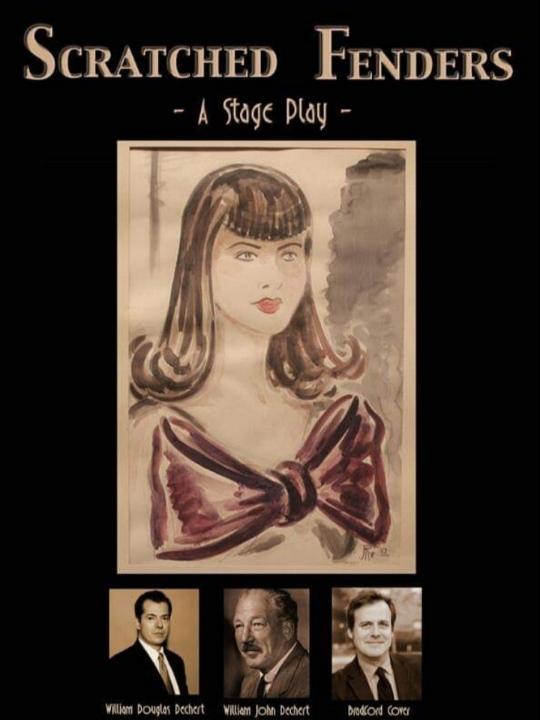







By Court Anderson
I was recently asked to read a part for a play I’d never heard of. I accepted. You see, the fellow who asked me is one of those old school NYC characters who manages, by dint of personality, to get his way. But more about him later. In truth, I said yes because I appreciate theater. Along with barbers and clergy, I find that theater folk are endlessly fascinating. In this, I wasn’t disappointed.
The setting for this small adventure demands a brief description. The Amateur Comedy Club (ACC) sits, rather demurely, near the corner of E. 36th St. and Third Avenue. The handsome two-story red brick building is a former carriage house. The east side opens onto a lovely gated courtyard with trees and plantings, known as Sniffen Court. Founded in 1884, the ACC is the oldest continually operating theatrical production company in the country. It is a nonprofit and a private men's club--women are invited to perform in productions, and may attend as guests of members.
The ACC is not a comedy club in the modern sense of the word, but a place where comedies (and tragedies) are performed. Its motto, Rideo Ergo Sum, means "I laugh, therefore I am."
The first floor is the theater itself, a charming venue. The second floor contains a clubhouse (with lockers for booze, a bar, a dart board, and an impressive array of tools for building sets), a creaky library filled with dusty copies of plays and literature about drama. Several worn and comfortable leather couches fill the room. Posters and photos of some of the thousands of productions over the years cover every inch of available wall space.
As a member explained to me, at the time of the club's founding, professional actors were considered to be less than gentlemanly. Theater was to be appreciated and performed out of a love of the art form, not for financial gain. And so it goes to this day at the ACC, one of the many rich stories that quietly gather new chapters over time, just beyond public purview, behind the million walls of the city.
Inside the ACC’s cozy environs, I met a number of eccentric troupers. It’s funny how you get to know a stranger better when both of you pretend to be someone else for a couple of hours. That’s exactly what transpired as we bashed through rehearsal.
Scratched Fenders is a three-act drawing room comedy that takes its inspiration from a fraught moment in American history. John Strachey, a British author and lecturer, visited the U.S. nearly a century ago. Strachey was accused of Communist Party affiliation, and while on American soil, he faced deportation under the Alien And Sedition Act. It became a a domestic national controversy and a diplomatic imbroglio highlighting fault lines across the American melting pot of culture, race and class. The play picks up this factual thread and imagines what transpired in the days that followed.
The setting: boom-town Kansas City, MO. The Strachey figure, Lionel Ashley, is about to be arrested. The daughter of a well-connected banker intervenes, and Ashley—along with his sullen, dissatisfied new bride, who happens to be Russian—is introduced to a host of Kansas City characters to great comedic effect.
As it happens, the themes of the play are relevant again in the modern American zeitgeist: communism hiding under academic robes, the bluster of capitalism, and the naïveté of American youth in their musings over which path to follow.
Alfred Lunt himself read Scratched Fenders. In a May, 1937 letter written during the Lunt’s residency in Chicago’s Erlanger Theater, he opined that “it is definitely better than the majority of plays sent in to us”, and regrets his tight scheduling constraints, having plays “mapped out for so many, many months ahead.”
The author of Scratched Fenders, William J. E. Dechert, was born in Lake Forest, Illinois in 1903. His father was a judge, and the family owned an insurance company. Dechert obtained an engineering graduate degree and an MBA from the University of Chicago. While he completed his studies, he taught history and coached the polo team at the Culver Military Academy.
By 1928, Dechert was an executive at Porter Chemical in Kansas City. He rose at Porter to oversee the construction of chemical plants from Africa to Asia. He became the liaison to Major General Claire Lee Chennault of the famed Flying Tigers, a group of American aviators who trained and directed the Chinese Air Force during WWII.
Dechert subsequently became the liaison to General Chiang Kai-shek until the end of the war, when he publicly resigned the post in protest over the Roosevelt administration’s lingering support for Mao Zedong. He found work at pharmaceutical giant Pfizer, where he oversaw the construction of all overseas laboratories starting in 1947.
The U.S. government agency that would later come to be known by academicians as COINTELPRO, drafted Dechert to quietly fix overseas imbroglios. The Brazilian government awarded him the solid gold Cruzeiro do Sul, the highest honorific it bestows. Dechert then helped to enact regime change against the communist-sympathizing President of Brazil, João Gulart, in the bloodless coup of 1964. Later, he organized the removal of Marxist revolutionary Che Guevara.
One wonders when William Dechert found the time to write the play, let alone to promote it. As often happens, the preservation of dear documents falls to the next generation. And so it has in this case. William’s son Doug has become the caretaker of Scratched Fenders.
They don’t make men like Doug Dechert anymore…probably due to liability concerns. Doug is, by various accounts, an arts & culture maven, a critic, a writer, and a galivanting boulevardier in the grand old style. He usually has a drink in hand—“it’s part of my motif,” he states—and always has a wry or ribald tale to tell.
Thus, it comes as no surprise that Doug has begun to assemble an enviable cast for a professional recording of the play. First in line? No other than writer, artist, cartoonist, poet, socialite, and party barnacle Anthony Haden-Guest. Perhaps no one alive embodies the haughty debauchery of Studio 54 New York, perhaps because all the rest have died. That said, Haden-Guest is not only kicking, he’s keen to play Lionel Ashley, the communist writer at the heart of Scratched Fenders. One imagines he’ll hardly have to act at all.
We kid, of course. Haden-Guest lends an immediate air of gravity to the enterprise, and shared his thoughts based on the reading at the ACC:
“The reading swept through like a powerful onrushing flow of seamless scenes which took shape in my head as I was immersed in a totally theatrical experience.”

The next theatrical light is John Corso, who directed the readings I was involved in. Corso’s CV is too lengthy to list here, but suffice it to say, he is the quintessential entertainment industry professional. John has worked with Hollywood’s most revered Oscar and Emmy award-winning talent and for every major studio and TV network on acclaimed feature films, TV series, national and international advertising campaigns, non-fiction content and indie projects.
Presently, John is at the helm of an impressive roster of high-profile feature film and TV projects including Eagle Scout, about the first young woman to achieve that titular rank in the Boy Scouts of America, and Winged Victory, about the famed Tuskegee Airmen.
Corso had this to say about Scratched Fenders:
"When I read William Dechert’s SCRATCHED FENDERS, my immediate impression was this timely and very funny and sparkling story, written nearly a century ago, would be well received by a modern audience. The drama as written would work well both as a legit Broadway show and also a motion picture.
I was delighted to work with the lovely and talented Eha Urbsalu and Daniella Salvi, indeed, with the entire cast and crew at the Amateur Comedy Club Theater (New York). I was honored to be invited to direct the show. The performance was well-received by the VIP audience in attendance. A terrific evening was had by all!
In preparation for my initial meeting with Doug Dechert, I presented a plan to produce a high-quality podcast as a prelude to production for the legit stage, a theatrical motion picture, and licensing to streaming TV. Such content created from books, plays, and movie scripts is not at all different from the old radio shows, and a source of substantial revenue flowing from multiple formats. We are commencing work on a star cast studio recording. I anticipate the show will be greatly successful.”
Also rumored to be involved is actor, screenwriter, musician, and songwriter Victor Colicchio, whose screenwriting credits include Summer of Sam, and whose acting credits include Inside Man, The Brave One, Goodfellas, The Deli, Bullets Over Broadway, The Sopranos, and Law & Order.
A little-known fact: Colicchio wrote the part of John Jeffries in Summer of Sam for Doug Dechert. Director Spike Lee liked the part so much, he took it for himself, and we are all a bit poorer for the decision.
In Doug’s eyes, the most practicable next venue for Scratched Fenders is online. Specifically, on Spotify Premium with a studio recording for streaming to a subsciption based audience.
This recording will be enlivened not only by Colicchio, but a host of other famous thespian pals from Doug's decades covering Gotham's glorious nightlife.
A reportable wrinkle is that Doug will not only direct the next recorded production, but use his own stentorian "basso profundo" to read the stentorian lead role. Offstage frisson will be further amplified by the placing of his own inamoratta, the Moscovite emigré painter and trained actress Anna Barysheva as the leading lady Sojna. Anna's work can be found on her eponymous website AnnaBarysheva.com.

Anna happens to be a blonde, grey-eyed femme fatale straight out of central casting for a Bond movie and comes by her intriguing Russian accent naturally. This Bogey & Bacall, Gable & Lombard type theatrical union can be expected to be catnip for the gossip columns in the future given Doug's thoroughly documented past with well-known models, debutantes, actresses, and other high profile beauties.
When did you last read a play? When was your last trip to the theater? Now…when did you last listen to a podcast or audiobook? On Spotify alone, there are over 12 million e-books. Furthermore, Spotify Premium has begun offering fifteen hours per month of free audiobook listening. Are subscribers using the service?
Yes.
25% of Spotify Premium users have listened to an audiobook. That equates to tens of millions of current users.
Given that more than half the entertainment audience in America has fled the woke content promulgated by Hollywood ideologues, the emerging market in pay-per-listen audio streaming for theatrical product represents a relatively easy entry point for a truly diverse roster of content providers. SCRATCHED FENDERS could be a test case in point to watch out for.






